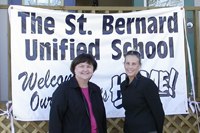Education Volunteers Wanted
As a first-year graduate student at Teachers College, I am concentrating on how education policy is developed and implemented. But no amount of classroom experience could have prepared me for what I saw unfolding in Louisiana's Hurricane Katrina-ravaged St. Bernard Parish on a recent visit.
As a first-year graduate student at Teachers College, I am concentrating on how education policy is developed and implemented. But no amount of classroom experience could have prepared me for what I saw unfolding in Louisiana's Hurricane Katrina-ravaged St. Bernard Parish on a recent visit.
As with virtually every aspect of life in the hurricane zone, education policy and practice is being reinvented ad hoc by people of enormous good will, indomitable spirit and very few resources. People like St. Bernard Superintendent of Schools Doris Voitier, who, along with a small group of fellow administrators, teachers and others, are trying to save what's left of the Parish's education system.
Before Katrina, St. Bernard's, which is predominantly white and middle-class, boasted 14 public schools with over 8,000 students and 750 teachers. As Katrina's waters swirled in, Voitier and a core group of her staff rushed to the high school to begin saving student records, computers and other valuable information and materials. But 14 feet of fast-rising, debris-ridden water drove them to the school's second floor, where they would spend the next three days trapped with no electricity, no running water, no sewage system, no cell phones, and 1,200 other refugees from the immediate neighborhood who had been ferried to safety in the school by a flotilla of heroic, private rescuers.
Eleven weeks later, Voitier and her dedicated fellow staff reopened the school and welcomed 150 students of all ages back to class. Today, The St. Bernard Unified School remains the Parish's only functioning school with nearly 1,400 students from pre-K through 12th grade served by 80 administrators and teachers, all working on reduced pay.
The surroundings are decidedly less than ideal. The lower school is housed in a series of crowded trailers linked together by a patchwork boardwalk. High school is taught on the second floor, while workers below restore the first floor. Everyone endures the constant din of reconstruction, including the jet-engine noise of huge blowers pumping clean, hot air into the building to dry out sodden walls and framing.
Lunch for all students is served in a makeshift cafeteria housed in a large, open tent across a parking lot. Because of the extraordinary circumstances, this is also the place where students congregate for after-school snacks while they wait for their parents to pick them up, which sometimes doesn't happen until late in the evening because of the traffic jams that seem to delay everyone everywhere these days the Parish.
Although many teachers have returned to St. Bernard, only a few have been rehired because the Parish population has fallen so drastically and there is little need for them. Gradually, more families are returning, but without housing and work, it is difficult for them to stay. The teachers at the school live in adjacent trailers, separated from their families.
St. Bernard's public school funding is based on a formula that involves matching federal and state support, with local support provided by the local tax base. But as Superintendent Voitier told me, "We have no effective tax base; everything is in redevelopment."
Consequently, without a clear understanding of how to procure reconstruction support from the Federal Emergency Management Agency (FEMA) and other federal sources, and because of the complexity of the process itself, Superintendent Voitier has not been able to leverage support for her schools. "We need money," she declared, branding its lack as the biggest barrier to rebuilding the school system.
What progress has been made has been through the remainder of St. Bernard Parish's state education funding or by credit established with local contractors and vendors. Voitier and her staff remain overwhelmed with the daily tasks of literally rebuilding the school and returning its children to some level of normalcy. "We must think of the welfare and education of the children first," Voitier said. "Making decisions about which teachers to hire and how to manage without money in hand are some of the most difficult ones I have had to make in my life."
The lesson is clear: the challenges of reconstruction are too extensive to leave to the local educational leadership alone. Communities hit by natural disasters like Katrina need special help if they are to reestablish themselves as the central, vibrant pillars of community life they were. As Voitier told me, "On top of the money concern, we are faced with a hierarchy of bureaucratic hurdles that impair our ability to gain the services and support we need."
Broad-scale, volunteer collaboration is one possible answer to the dilemma. For example, TC, Columbia and other schools could sponsor field projects in which experts in federal emergency relief, such as former FEMA staffers, could volunteer to work directly with someone like Doris Voitier to revitalize her school. Or they could sponsor teams of education consultants that could provide a range of expertise.
Imagine the progress if cadres of such experienced "education volunteers" were to take on the bureaucracy, leaving the superintendents free to do what they do best-'"educate children. Because successful schools are the pillars of successful communities, I believe the time is now for the education community, as a whole, to step forward in this time of national emergency."
Emily Morgan taught fifth grade at an elementary school in Maryland and is currently pursuing her Ed.M. in the Leadership, Policy and Politics Program at TC.
Published Tuesday, Apr. 25, 2006
